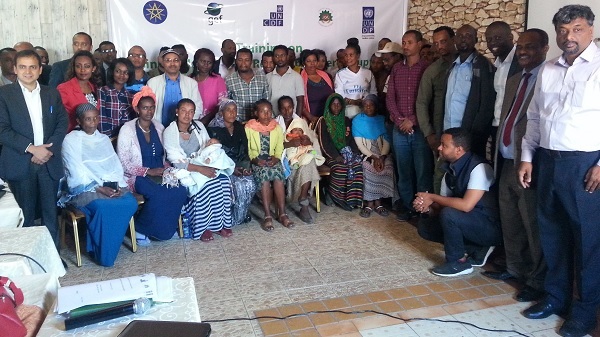
The training will support renewable energy technology companies from various regions to develop their business plan so that they can expand their business effectively
ADDIS ABABA (UNDP Ethiopia)–A training on “Business Planning for Renewable Energy Technology Suppliers” is being organized in Bishoftu from 12 -14 December 2018 for 18 Renewable Energy Supply companies, representatives from the Regional Energy Bureaus and representatives from Ministry of Water Irrigation and Energy and Environment, Forestry and Climate Change Commission.
The training program is jointly organized by the Ministry of Water Irrigation and Energy (MoWIE), the Development Bank of Ethiopia (DBE), United Nations Development Programme (UNDP) and United Nations Capital Development Fund (UNCDF).
The training will support renewable energy technology companies from various regions to develop their business plan so that they can expand their business effectively, access credit from financial institutions and attract investments. The energy companies will learn about the different aspects of business planning and develop their draft business plan that will be further refined with the support from the project.
Energy Poverty is one of the major challenges facing Ethiopia. According to the Tracking SDG7, about 25% of the population have access to electricity and only 4% of the population have access to clean cooking solution. Expanding access to energy in rural areas is an important priority for the Government of Ethiopia (GoE), which recognizes that providing access to energy stimulates rural economic growth, reduces poverty and contributes towards Sustainable Development Goals.
At the opening ceremony of the training program on behalf of UNDP, Ms. Kidanua Abera, Inclusive Growth and Sustainable Development unit, highlighted the central role that the private enterprises play in Ethiopia’s commitment to expand access to energy in rural areas. She explained that the access to energy will stimulate the rural economic growth and reduces poverty. She also said this initiative has direct contribution in achieving the Sustainable Goals specially in ensuring the “leaving no one behind path.
Mr. Prem Sagar Subedi of UNCDF highlighted the role of renewable energy technology suppliers in providing quality products and services to reduce the energy poverty in the country. Mr. Subedi introduced about the CleanStart Project which envisions promoting access to clean energy financing through partnership with energy and financial service providers. He also explained that the business plans of the renewable energy suppliers will not only help accessing the credit facility from the financial institutions but also be useful in effectively operate their companies.
Ato Yiheyis Eshetu, Director, Alternative Energy Technology Development and Promotion Directorate, Ministry of Water Irrigation and Energy expressed the commitment of Government of Ethiopia in promoting renewable energy technologies. “Based on the climate Resilience Green Economy Strategy and Energy Policy of the country, Ethiopian has been engaged on the development of renewable energy technologies and sources that conserve forest resources and reduce pollution” said Ato Yiheysis.
The training is organized as part of a joint project, Promoting Sustainable Renewable Energy Technologies (RETs) for Household and Productive Uses” that is financed by the Global Environmental Facility (GEF), bringing together UNCDF, MoWIE and Development Bank of Ethiopia together with other stakeholders .
The project implements a more private sector-driven and market-based approach towards promoting renewable energy technologies in rural communities in Ethiopia. Through this intervention household and productive sectors in the rural areas will be encouraged to enhance their use of renewable energy technologies, such as solar lighting solutions, improved cook stoves and domestic biogas plants, improved fuels such as briquettes.
A Credit Risk Guarantee Fund has been established to increase the availability of capital for investments (capex) or working capital requirements (opex) of RET enterprises, which is identified as one of the main barriers for RET enterprises to run and expand their business. This fund has been placed with the National Bank of Ethiopia in a blocked account and is serving as the guarantee. The fund is administered by the DBE which acts as the guarantor.
By 2020, the project seeks to facilitate access to renewable energy for 1.5 million beneficiaries, including 290,000 low-income households. This in turn is expected to lead to a reduction in Ethiopia’s energy-related CO2 emissions by approximately 2 million tons carbon dioxide equivalent.
Source: UNDP Ethiopia
